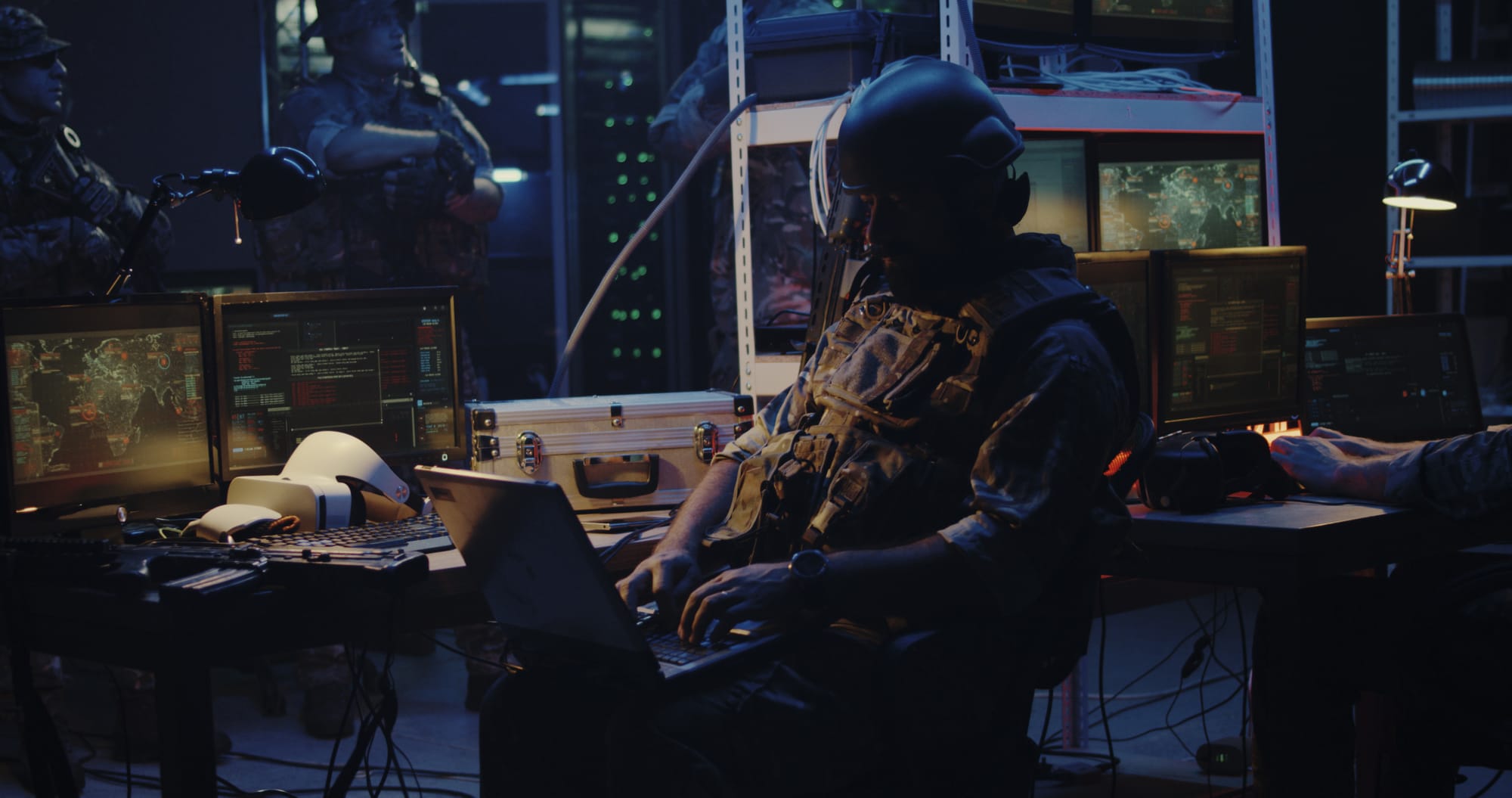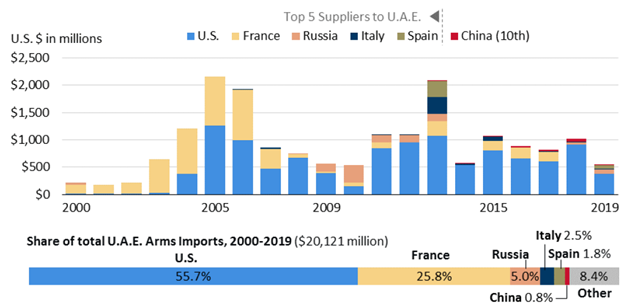UAE’s evolving defense strategy in a changing world

Despite being one of the smaller countries around the world, (approx. 1.5 million citizens), the UAE happens to be one of the wealthiest countries per capita. Located in the highly strategic Gulf region, the UAE is the fourth—largest petroleum exporter and possesses 8% of the world’s proven oil reserves. Geographically speaking, UAE borders Saudi Arabia & Oman along the southeast coast of the Gulf. On Its northernmost point, it is near and to a strategically crucial maritime checkpoint, the Strait of Hormuz, and is separated by Iran by a narrow strip of water Given the abundance of natural resources, volatile neighboring countries and relatively small demographic, UAE has to cope with many complex security challenges.
The following are some key aspects of UAE’s evolving Defense Strategy:
- Cementing UAE’s strategic alliance with Saudi Arabia by Trade & mutually beneficial interests:
A key partnership for the UAE (besides the United States) is with the five fellow Gulf Cooperation Council member states, specifically Saudi Arabia. A GCC summit held in Doha in 2014, agreed to establish a joint military base in Bahrain and a strategic base in Abu Dhabi. The recent conflict resolution between Ethiopia and Eritrea by UAE & Saudi Arabia further established both countries as regional leaders.
- Arms Sales: Trends & Analytical Perspectives from 2000 to 2020
U.S. arms are central to the UAE’s growing military capabilities (see Figure 1); major sales from the United States include the purchase of 80 F-16s in 2000 and an additional 30 in 2014. Moreover, the UAE’s purchase of the THAAD missile defense system, initially proposed in 2008 and approved in late 2011, represented the first sale of the system abroad. However, like its close ally Saudi Arabia, the UAE appears to be attempting both to diversify its sources of arms imports and build up domestic production capacity, partly in response to concerns about U.S. policy.

In response to previous U.S. reluctance to sell the UAE long-sought F-35s due to concerns about Israeli security, the Emiratis evidently had started looking elsewhere, specifically Russia, for advanced combat aircraft. Media reporting indicates that the two nations signed an agreement in the spring of 2017 to develop a fifth-generation fighter jet, along with a separate purchase by the UAE of Russian Sukhoi Su-35 fighters. Some speculated that the UAE’s engagement with Russia was intended to gain U.S. concessions on F-35s or other possible transactions due to U.S. concerns regarding Russia-UAE arms dealings. In November 2020, several months after Israel and the UAE announced an agreement to normalize their relations, the Trump Administration notified Congress of its intent to sell the UAE up to 50 F-35s, along with $10 billion in munitions.
- UAE-USA Defense Cooperation:
One of the cornerstone attributes of the UAE defense strategy is dependent upon its highly valued and close economic ties with the US. UAE happens to be the only Arab state that participated with the US in six coalition actions over the last 30 years (Afghanistan, Libya, Somalia, Bosnia-Kosovo, Gulf War & fight against ISIL). The UAE and US armed forces regularly cooperate on both training and operational missions & exercises to strengthen their alliance.
- Cybersecurity
The UAE’s Cyber Security Center warns us that the country is now the second most targeted in the world, following the United States, and is under constant threat from criminals, intelligence agencies, terrorist groups, and hacking collectives. In November 2020, the UAE Cabinet agreed to establish the UAE Cybersecurity Council with the aim of developing a comprehensive cybersecurity strategy and creating a safe and strong cyber infrastructure in the UAE.
- Using “soft power” to promote its interests:
As it has expanded its regional and international profile, the UAE has increasingly deployed its financial muscle, particularly through development and humanitarian assistance programs, to promote its interests and project influence beyond its borders. The tools of soft power are particularly attractive to a small and vulnerable country that needs, insofar as possible, to minimize conflict with neighbours and maximize friendly relations with potential rivals. The UAE has sought to use its financial, humanitarian, and media muscle to push back against Islamist groups and promote alternatives in the Arab world. The UAE deployment of aid and development as tools of statecraft and soft power influence was one of its earliest foreign policy practices. Dating back into the 1980s, the UAE sought to use aid to develop key international relationships and enhance its image through public diplomacy. This approach has not only helped in maintaining friendly relationships with neighboring countries but has also curbed the spread of hardline Islamist influence.
- Maintaining and developing its crucial alliance with GCC member states, other Arab countries, and international partners:
A key aspect of UAE’s national security strategy is its inclusion in the Gulf Cooperation Council. Since most of the countries in the GCC share linguistic, geographic & cultural affinities, it is easy for the countries to be aligned for shared economic, political, and security interests. The evolving defense strategy is a testament to the fact that many Gulf States (especially UAE) face unprecedented security challenges. Challenges that no longer are confined to military, security, or economic aspect but also include social, environmental, and technological issues. This “holistic” view of national security means that all capabilities and resources of a country are being considered to defend its interests and values against external and internal dangers. To combat the multiple sources of threat to national security, Manar Military Consultancy aids defense ministries and public safety institutions by providing strategic reports and consultancy services.
Here is how MMC uses decades of collective experience to overcome security challenges:
Strategic Planning: Working closely with defense ministries, military forces, police forces, and justice ministries, our handpicked expert specialists explore new methods to improve operational efficiency by, for example developing a performance-management system to implement a new strategic plan, creating a human-capital strategy to assist in military command, redesign security clearance processing system to improve day-to-day operations, etc) This not only decreases unnecessary company expenses such as inventory cost, labor, etc but also optimizes operations outcome. Our senior specialists also work together with defense organizations to completely redesign IT infrastructures by consolidating redundant assets, integrating overlapping applications, and optimizing cybersecurity of the IT system.
- Organization: Organizational changes are common nowadays, as Organizations struggle to adapt to the volatile politico-economic international climate. Competitions, technological innovations, demographics, are just some of the factors that shape the process of organizational adaptation.
- To streamline the process, MMC brings a range of proprietary tools and a wealth of experience to help defense and security clients address challenges dealing with how an organization Is structured and run, maximizing the lifetime value of human capital, conducting organizational diagnostics, and implementing major transformational changes.
- Operational transformation: Optimizing procurement and contracting strategy, by determining project objectives such as HSE, Quality, Cost, Time, Operational reliability, sustainability, etc…
- Redesigning maintenance and supply chain processes (integration of suppliers with customers to create value, acquisition of external information, and deployment of said information into practices that produce marketable outputs),
- Also, focus on transforming administrative processes such as human resources, marketing, and accounting for maximum productivity.
- Process transformation: MMC also helps corrections systems, police forces, and justice systems more effectively utilize resources by teaching them how to leverage technology better.
- This includes improving interfaces with police and court systems, advising defense agencies on the best course of action to create an integrated system for record-keeping, and promoting department—level collaborative work by removing organizational obstacles.
- For more information, please visit us on our website : https://mmc.ae.org


